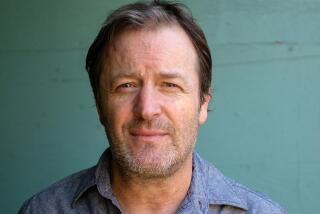BOOK REVIEW : Alienation Waits to Become an Accident : THE ACCIDENT <i> by David Plante</i> ; Ticknor & Fields; $18.95, 151 pages
- Share via
Narrated by a young man in “the last year of my adolescence, the first year of my maturity,” this brief novel is a triumph of compressed intensity.
In language that strikes a delicate balance between the colloquial and the elegiac, David Plante in “The Accident” explores the complex emotions of his 19-year-old protagonist during an anguished year abroad.
Although he never tells us his name, that seems incidental when we know everything else--that he has temporarily left the secure confines of his French-Canadian family and their tight-knit New England community to study at the Catholic University of Louvain in a small provincial Belgian town.
Introducing himself during a stopover in Paris, he admits at once that he’s hopelessly alienated, confused and filled with obscure yearnings for “what I felt couldn’t be fulfilled even by making love, only by throwing myself into the river, not to die, but to be taken somewhere else on its current. . . .”
That sensation of otherness has been building within him since childhood, exacerbated by the insularity of his family, the strictness of his religious training and his own hyper-acute sensitivity. Wandering aimlessly around Paris, he would see “in a street market stall, not an egg, not the straw adhering to the shell, but a thin seam in the straw.”
On the train from Paris, he meets an American graduate student who has come to Louvain to write her dissertation on culpability. Despite, (or perhaps because of) her subject, Pauline is almost frenetically merry, assuring the protagonist that Louvain offers a smorgasbord of all the usual opportunities for diversion. Her anecdotes only seem to heighten the protagonist’s unease. He finds the town chilly, gray and unwelcoming; a bleak contrast to Spain, where he had spent a few happy weeks on his way to this purgatory.
Eventually, his reserve is penetrated by Tom Donlon, another American whose eager, bumptious friendliness serves as a cover for anxieties equal to the narrator’s own. To him, Donlon seems to be striving for sainthood: renting a wretched room because he pities the landlady, seeking every opportunity for self-effacement, trying gently but persistently to revive the narrator’s lost faith.
Treated with disdain, teased and goaded, Donlon responds with unfailing good nature, as if a period as laughingstock were a necessary stage on the road to ultimate grace.
Once Donlon encounters his old Fordham classmate, Vincent Vosac, at a student cafe and is introduced to Vincent’s girlfriend, Karen, the tension escalates. Karen is wild and defiant; Vincent cool and vaguely thuggish. Although ostensibly attached to Vincent, Karen revels in the admiration of both Donlon and the narrator, managing to make both young men fall in love with her. Donlon is pathetically vulnerable; the narrator only slightly less so.
“He makes me want to be bad to him,” Karen says. “Doesn’t he do that to you?”
Soon all three are united in a campaign to break Donlon’s fragile faith in God and in himself, unaware of how precarious that faith actually is.
Just when these sexual, religious and intellectual conflicts reach an apex, the four Americans set off for a holiday in Spain, an adventure inspired by the narrator’s ecstatic descriptions of that country. Packed into a tiny car, driving in a blinding downpour, they narrowly avert one accident. But their euphoria makes them reckless.
Restrained and spare, “The Accident” manages to investigate profound subjects with remarkable deftness. Continually testing the boundaries of the coming-of-age novel, the author probes emotional and spiritual depths lying far beneath the superficial layers of the form.
Although the ending is melodramatic, portended almost from the beginning, the effect is in no way reduced by its inevitability. No other would have been possible, given the characters and circumstances Plante has created.
Next: Carolyn See reviews “Dagny” by Mary Kay Norseng (University of Washington).
More to Read
Sign up for our Book Club newsletter
Get the latest news, events and more from the Los Angeles Times Book Club, and help us get L.A. reading and talking.
You may occasionally receive promotional content from the Los Angeles Times.









